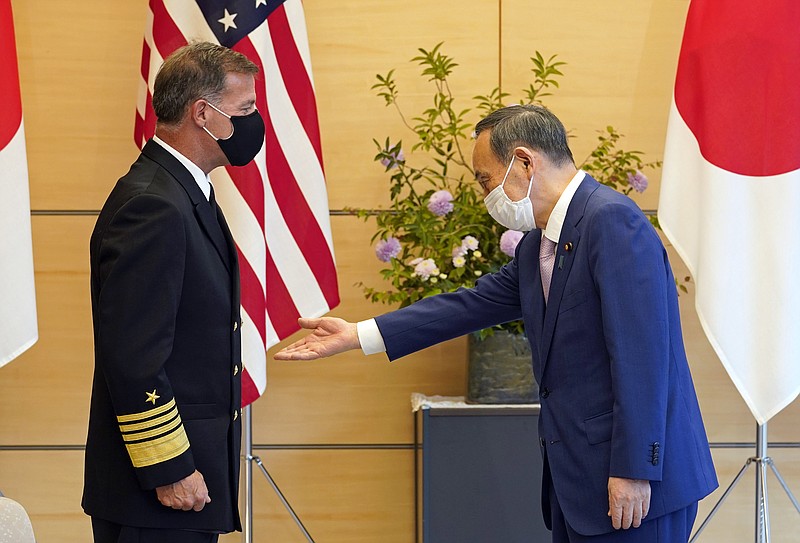Japan, U.S. affirm
regional alliance
The Associated Press
TOKYO -- The new head of the U.S. Indo-Pacific Command held talks with top Japanese officials Tuesday and reaffirmed their alliance amid China's increasingly assertive claims to contested areas in the region, officials said.
Adm. John Aquilino, who assumed the post in April, and Japanese Foreign Minister Toshimitsu Motegi shared their concern about China's "continuous and intensified attempt to unilaterally change the status quo in the East and South China Seas," the Foreign Ministry said in a statement.
"Under the current circumstances, the importance of the alliance is greater than ever," Motegi told Aquilino in his opening remarks.
The two sides also reaffirmed the importance of peace and stability in the Indo-Pacific region and agreed to further strengthen their joint response capability and deterrence to achieve a "free and open Indo-Pacific."
Japan and the U.S. have been promoting the goal of a free and open Indo-Pacific, a defense and economic framework, in a group known as the Quad, which also includes Australia and India, that is seen as a move to counter China's increasing influence in the region.
China has criticized the group as an exclusionist bloc based on a Cold War-era mindset.
Japan is looking to bolster its military capabilities amid a deepening territorial row with China in regional seas. It is increasingly concerned about Chinese activity in and around Japanese-claimed waters surrounding the Japanese-controlled Senkaku islands, which China also claims and calls Diaoyu.
Japan's postwar constitution has limited the use of force to self defense, but the country has in recent years expanded its military role, capability and budget.
Aquilino also held similar talks with Prime Minister Yoshihide Suga, Defense Minister Nobuo Kishi and top Japanese military officials and discussed North Korea's nuclear and missile programs, the Foreign Ministry said.
New Zealand signs
on to NASA accord
The Associated Press
WELLINGTON, New Zealand -- New Zealand announced Tuesday it was the latest country to sign a space agreement with NASA, just as New Zealand's nascent space industry begins to take off.
New Zealand became the eleventh signatory to the Artemis Accords, a blueprint for space cooperation and supporting the U.S. space agency's plans to return humans to the moon by 2024 and to launch a historic human mission to Mars.
Foreign Minister Nanaia Mahuta said New Zealand is one of only a handful of nations able to launch rockets into space.
New Zealand said it's particularly interested in making sure that minerals taken from the moon or elsewhere in space are used sustainably.
California-based company Rocket Lab, which specializes in putting small satellites into orbit, made history in New Zealand four years ago when it launched a test rocket into space from the remote Mahia Peninsula. It began commercial launches in 2018.
Rocket Lab founder Peter Beck, a New Zealander, said signing the accords was testament to the country's growing role in the space industry and opened the door for collaboration and mission opportunities with NASA.
There could also soon be a second New Zealand launch site. The government announced Tuesday it was partnering with indigenous Maori to buy land in the Canterbury region to develop a space launch site.
Estimates indicate the New Zealand space industry is worth $1.2 billion.
NASA Administrator Bill Nelson said in a statement that New Zealand was one of seven nations that helped craft the principles in the accords and he was delighted they had signed up.
The other signatories to the accords are the U.S., Australia, Britain, Canada, Italy, Japan, Luxembourg, South Korea, the United Arab Emirates and Ukraine. Brazil also said it plans to sign.

